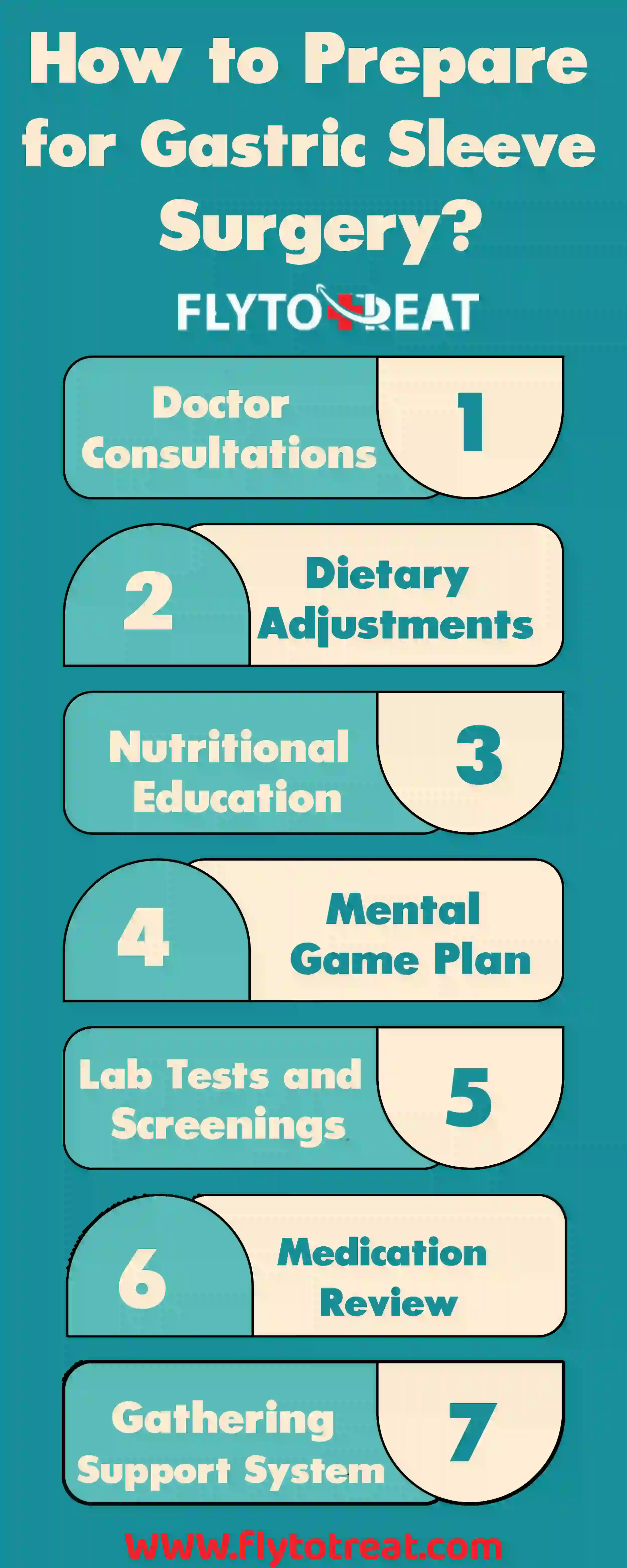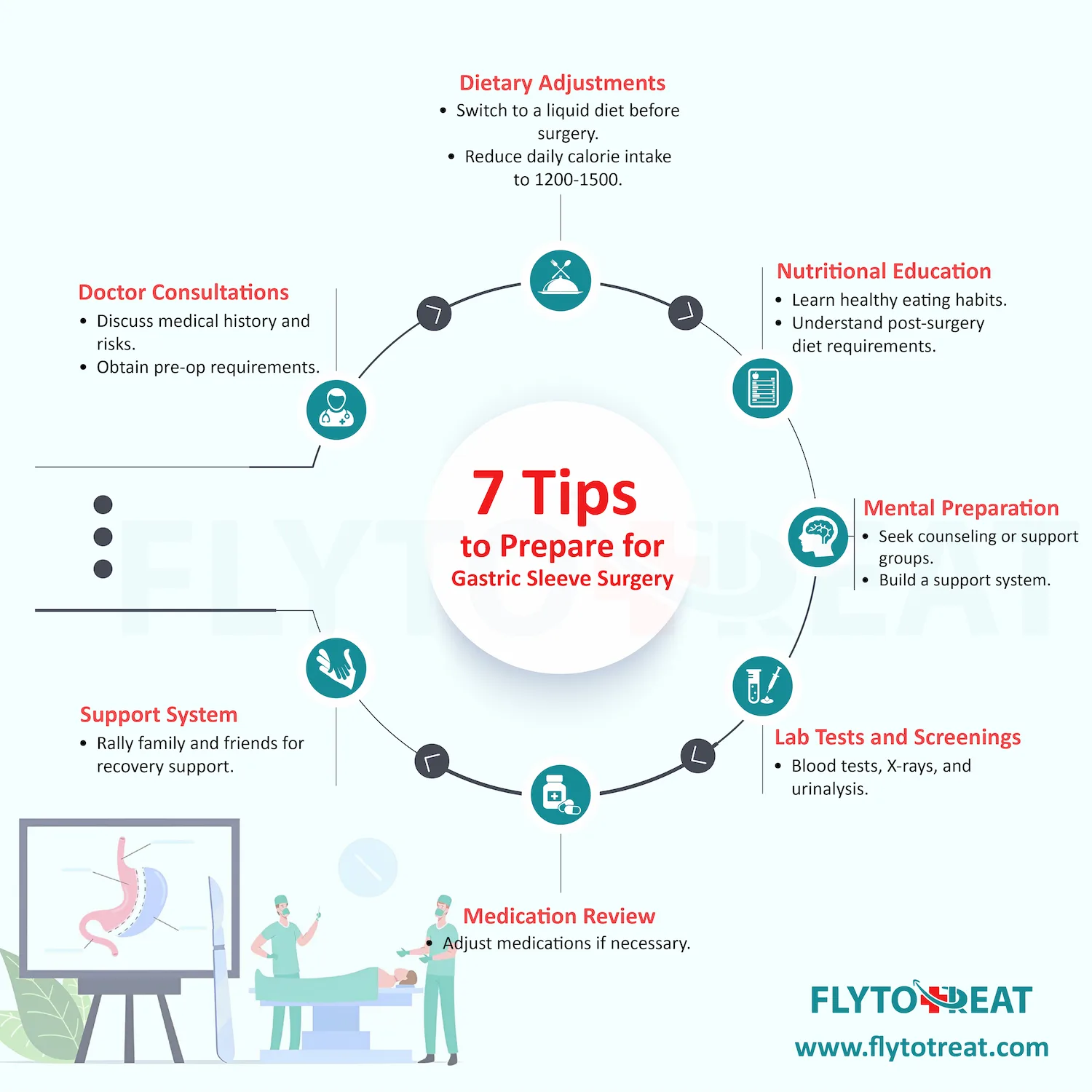
How to prepare for gastric sleeve surgery?
Understanding the preparation for gastric sleeve surgery is essential for ensuring a smooth and successful procedure. FlyToTreat offers a comprehensive Sleeve surgery guideline to help you navigate the necessary steps before your surgery. This article will answer essential questions such as "What is the process before getting a gastric sleeve?" "What tests are done before gastric sleeve surgery?" and "What not to do before bariatric surgery?" to ensure you are well-prepared for your weight loss efforts.
What is required before gastric sleeve surgery?
Before embarking on a gastric sleeve journey, preparation for sleeve gastrectomy is crucial, and pre-op surgery can affect on sleeve surgery success rate. Here are some critical gastric sleeve pre-op requirements:
• Medical Evaluation: Expect a thorough evaluation by your doctor and specialists. This includes reviewing your medical history, current medications, and weight loss attempts.
• Blood Tests and Scans: Blood tests, X-rays, or other imaging studies are necessary to assess your overall health and suitability for gastric sleeve surgery.
• Dietary Changes: A pre-operative sleeve surgery prep diet, often liquid-based, might be recommended to shrink your stomach and facilitate the procedure.
• Lifestyle Modifications: Smoking cessation and exercise programs before sleeve gastrectomy are often encouraged to improve overall health and surgical outcomes.
• Psychological Evaluation: Mental preparation for sleeve gastrectomy surgery is vital. Some programs may require psychological evaluation to ensure mental preparation for weight loss and a robust support system.
These are general guidelines. Your doctor will provide specific instructions tailored to your individual needs. Consulting them is essential before undergoing gastric sleeve surgery to see if you are a good candidate for gastric sleeve.
How to Prepare for Gastric Sleeve Surgery?
Gastric sleeve surgery can be a powerful tool for weight loss. Gastric sleeve surgery is a turning point in your life, so you have to know about Pre-op and post-op Guidelines. Here's a roadmap to prepare for a successful gastric sleeve procedure:
1st step; Doctor Consultations: Schedule meetings with your surgeon and specialists to discuss your medical history, risks, and gastric sleeve pre-op requirements. They can provide you with guidance and adjust your expectations. That is why consulting a doctor before gastric sleeve surgery matters.
2Sd step; Dietary Adjustments: To shrink your stomach and ease the procedure, a switch to a liquid diet a few days before gastric sleeve surgery might be recommended. Even a month before the surgery, you need to reduce your daily calorie consumption to 1200-1500.
3rd step; Nutritional Education: Learn healthy eating habits for long-term success after sleeve gastrectomy. You need to know what the diet is after gastric sleeve surgery and What is forbidden to eat after the sleeve gastrectomy.
4th step; Mental Game Plan: Gastric sleeve surgery is a tool, but lasting weight loss requires commitment. You must be mentally ready to change your lifestyle after bariatric surgery and incorporate healthy habits after gastric sleeve surgery. Consider counselling or support groups for mental preparation for weight loss.
5th step; Lab Tests and Screenings: As you prepare for gastric sleeve surgery, You should undergo a series of lab tests and screenings to ensure you are in optimal health. This step in your preparation for sleeve gastrectomy surgery involves detailed blood tests, X-rays, and urinalysis, among other assessments. In addition to physical evaluations, mental preparation for weight loss is also a critical aspect of how to prepare for bariatric sleeve surgery.
6th step; Medication Review: Discuss any medications you take with your doctor, as some may need adjustments before surgery. What medications are forbidden before sleeve gastrectomy? Arthritis medications, NSAIDs like aspirin, Tylenol, Advil, Motrin, and Aleve.
7th step; Gather Your Support System: Rally your family and friends to assist you through the recovery process. A robust support system is essential as you prepare for gastric sleeve surgery. Having your loved ones by your side can provide emotional encouragement and practical help, making the transition smoother and less stressful.

What is the diet before gastric sleeve surgery?
In the days leading up to your gastric sleeve surgery, a specific diet during preparation for gastric sleeve surgery plays a crucial role. FlytoTreat provides an essential guide to the gastric sleeve diet. Here's a glimpse into its important points:
• Focus on Liquids: A switch to a clear liquid diet, consisting of broth, sugar-free drinks, and water, is often recommended for 1-2 weeks before surgery.
• Gradual Transition: This dietary shift helps shrink your stomach size, making the surgical procedure more straightforward and potentially reducing risks.
• Nutritional Support: Your doctor may recommend protein shakes or supplements to ensure you get essential nutrients during this pre-op phase.
• Doctor's Guidance is Key: The specific details of your pre-operative diet will be determined by your doctor based on your individual needs and health.
What is the Diet 2 Weeks Before Gastric Sleeve?
The road to a sleeve gastrectomy diet begins with a pre-operative diet to shrink your liver and improve surgical visibility. Expect a low-calorie bariatric diet starting two weeks before surgery. In the days leading up to the procedure, you might transition to a clear liquid diet of broth, water, and sugar-free drinks. Your doctor may also recommend vitamin and mineral supplements. Following this pre-operative plan is crucial for optimizing your health and ensuring a smooth surgery.
What Not to Do Before Bariatric Surgery?
Bariatric surgery is a significant step, and proper preparation for gastric sleeve surgery is critical. Is it necessary to know what you can eat or do before sleeve surgery? Here's what to avoid in the weeks leading up to surgery:
• Smoking before sleeve surgery: Smoking can slow healing and increase infection risk. Quitting well in advance, as recommended by your doctor, is crucial (prep for sleeve surgery).
• Can I drink Alcohol and Drinks before sleeve surgery? Avoid alcohol and sugary drinks like soda and juice. These can dehydrate you and interfere with anaesthesia during surgery.
• Heavy or Greasy Foods: Focus on a clear liquid diet or light, low-fat meals as instructed by your doctor. Heavy or greasy foods can make surgery more difficult.
• Certain Medications: Discuss any medications you take with your doctor. Some medicines need to be adjusted or stopped before surgery.
• Dehydration: Staying well-hydrated is very important. Drink plenty of clear liquids as advised by your doctor.
Following these guidelines helps optimize your health and ensure a smooth surgery and professional pre-operation activity for sleeve gastrectomy. Consult your doctor for specific gastric sleeve pre-op requirements and any questions you may have.

How is psychological clearance for bariatric surgery?
Bariatric surgery is a life-changing decision, and mental readiness is critical. Psychological clearance during preparation for gastric sleeve surgery helps ensure success:
• Understanding Sleeve surgery process: A psychological evaluation assesses your understanding of the surgery, lifestyle changes, and potential challenges.
• Identifying Emotional Factors: Discussing your relationship with food and weight can help identify any underlying emotional issues that could impact your post-surgery success.
• Building a Support System: The evaluation may explore your support system to ensure you have a solid network to aid you through the journey.
• Developing Healthy Habits: You might learn coping mechanisms and strategies to build healthy eating and exercise habits for long-term weight management.
Psychological clearance is not a pass-or-fail test. It's a collaborative process to ensure your mental preparation for weight loss and have the emotional tools to thrive after bariatric surgery.
What is essential about gastric sleeve surgery blood test
Blood tests are a crucial component of preparation for gastric sleeve surgery. Here's why they're essential:
• Overall Health Assessment: A complete blood count (CBC) and other blood tests evaluate your red and white blood cell counts, organ function (like liver and kidneys), and blood sugar levels. These provide a snapshot of your overall health and suitability for surgery.
• Nutritional Deficiencies: Certain tests may check for deficiencies in iron, vitamin D, or other essential nutrients. Addressing these deficiencies beforehand can optimize your health and recovery.
• Bleeding Risk Assessment: Blood tests help assess your blood clotting time and any potential bleeding risks during surgery.
Specific tests may vary depending on your doctor's recommendations and individual health history. Discuss any questions you have about these tests with your doctor.

Conclusion
In conclusion, thorough preparation for gastric sleeve surgery is crucial for achieving the best outcomes. FlyToTreat emphasizes the importance of following pre-op dietary guidelines, undergoing necessary medical evaluations, and ensuring mental readiness for the lifestyle changes ahead. By adhering to these preparatory steps and consulting with your healthcare provider, you can enhance your chances of a successful surgery and a healthier future. Remember, the journey to weight loss and improved health begins with careful planning and commitment.
MEDICALLY REVIEWED BY: Dr. Ali Bazazi
AUTHOR: FlytoTreat's team of Authors
29 May 2024 - Updated At: 27 July 2024
Related Articles
Comment






